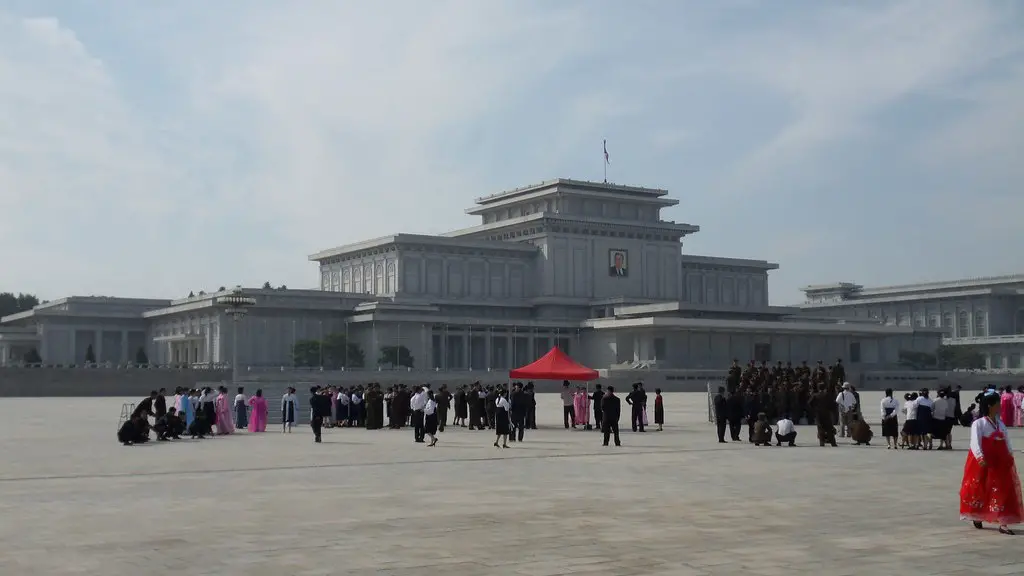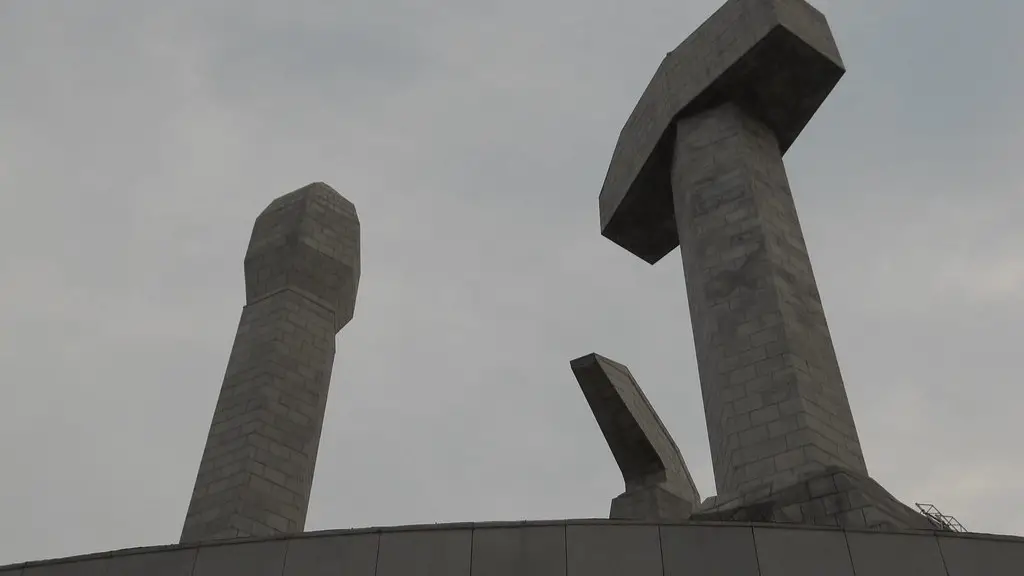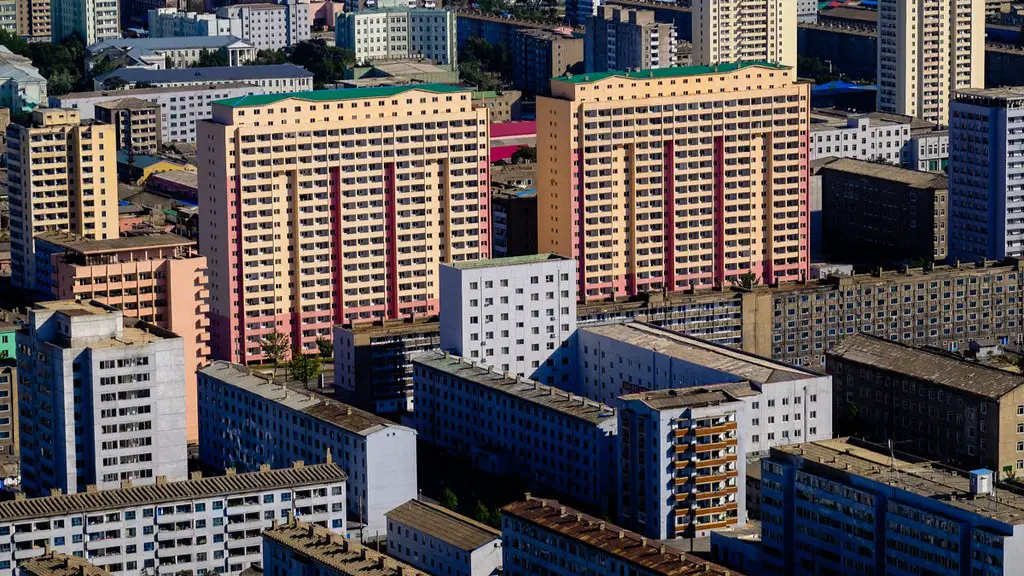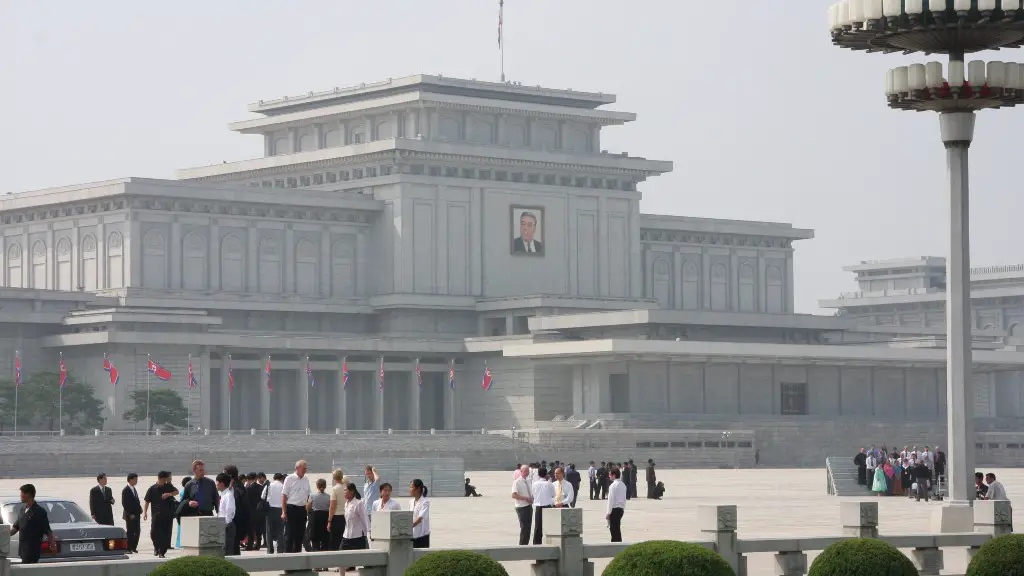Division of North and South Korea
The division of North and South Korea is a complex and often tragic tale of political and cultural upheaval. The division began in 1948, when the Korean peninsula was freed from the rule of Imperial Japan by the United States and the Soviet Union. Both superpowers immediately began to compete for control of the newly liberated Korean peninsula. The disparate visions for a united Korea led to a division of the peninsula into North and South Korea, and this division has been in place since.
The modern division between North and South Korea can be traced back to the Cold War era of the early twentieth century. After the Second World War, the Cold War began between the Soviet Union and the United States. Both countries sought to expand their respective spheres of influence, and the newly liberated Korean peninsula was a valuable prize. The Korean peninsula had already been under the rule of Imperial Japan for decades, and now that Japan had been defeated it was open for competition.
The United States initially sought to create a single unified Korean state, although the Soviet Union vehemently opposed the plan. In 1948, the American plan was rejected by the Soviet Union, and the two sides declared a division of the peninsula into North and South Korea. Each side declared its respective part of the peninsula to be a separate nation, with the United States backing South Korea and the Soviet Union backing North Korea. The two countries have since been locked in a tense conflict, and the division of North and South Korea has become a permanent feature of the region.
The split between North and South Korea was not simply a political conflict, but also a cultural divide. North Korea’s society was heavily reliant on traditional and Marxist ideology, while South Korea was a much more open, modern society. This cultural divide has meant that the two countries have had very different experiences over the past decades, with South Korea quickly entering the modern age while North Korea remains isolated and oppressive. The two countries have had almost no contact with each other in the past decades, and this has further deepened the divide between them.
The division of Korea has had a devastating impact on the Korean peninsula as a whole. Millions of families were separated by the division, with many never able to see their relatives in the other country again. The two countries have continued to confront each other in a tense military standoff, which has inflicted significant economic and social damage on both sides. The division of North and South Korea has frozen the peninsula in a state of cold war, and the two countries are yet to find a way to peacefully reconcile.
Economic Impact of the Division
The division of Korea has had a profoundly negative effect on the economy of the peninsula. With the two countries locked in a tense standoff since 1948, there has been no opportunity for meaningful economic integration between them. This has meant that their respective economies have been locked into a state of stagnation, with inadequate investment and growth in key industries. This has caused the quality of life in both countries to suffer, and it has also significantly limited economic opportunities for people living in the region.
The economic integration of North and South Korea would provide significant economic benefits for the entire peninsula. A unified economy would create more efficient trade, investment and labour flows, which would significantly boost economic output and living standards. For example, the development of efficient regional transport links, which are currently impossible due to the division, would help to promote greater economic integration. Similarly, a lift of the current restrictions on trade and investment between the two countries would provide a strong boost to their respective economies.
Ultimately, the benefits of unification would extend beyond the peninsula. The unified economy of Korea would become a powerful force in the Asian region, giving rise to a new era of growth and development. The presence of a powerful and unified Korean economy could also act as a stabilising influence in the volatile East Asian region, helping to create a more peaceful and prosperous future for the entire region.
Unfortunately, the current political climate makes the unification of North and South Korea seem unlikely in the short-term. The two countries still face huge economic and cultural divisions, and the political obstacles to a unified Korea remain enormous. However, hope still remains that in time the two sides will find a way to bridge the divide and reunify the Korean peninsula.
Impact of Cultural Foundations
The split between North and South Korea has been accompanied by a deep cultural divide. North Korean society is rooted in traditional and Marxist ideology, while South Korean society is open and modern. This cultural divide is a result of the different systems of government in the two countries. North Korea has been run as a repressive dictatorship since its founding in 1948, while South Korea has been a democracy since the late 1980s.
The cultural divide between North and South Korea is further exacerbated by the governments’ respective human rights records. North Korea is notorious for its extreme levels of human rights abuses, while South Korea is considered to be far more open and progressive. This stark contrast has meant that the two countries have developed two very different societies, which has further entrenched the division between them.
The cultural divide has made meaningful exchanges between the two countries more difficult, and has further alienated them from one another. This cultural gap has been a major obstacle to peaceful unification, and has made it more difficult for people from the two countries to understand each other’s perspectives. Additionally, the cultural divide has made it difficult for North and South Korea to cooperate on economic and political issues, as the two countries are often unable to find any common ground.
At the same time, the cultural divide has had some positive consequences. North and South Korea have both been able to thrive in their own unique ways, and the cultural diversity of the Korean peninsula has given rise to a number of vibrant and dynamic cultures. Similarly, the cultural divide has allowed each country to celebrate and honour its own unique traditions and heritage.
Ultimately, the cultural divide between North and South Korea is unlikely to be overcome easily. Yet, with increasing dialogue and understanding it may become possible for the two countries to reconcile and find common ground. This could pave the way for a peaceful unification of the Korean peninsula, and make it possible for the two countries to begin a new era of cooperation and progress.
Changes in Political Outlook
The division of Korea has meant that the political outlook of the two countries has evolved differently. North Korea remains a repressive authoritarian state, while South Korea has established a liberal democracy. This has meant that the two countries’ respective political systems have diverged significantly over the years.
The division has further exacerbated the political divisions between the two countries. North Korea’s political system is much less open than South Korea’s, causing significant obstacles to reconciliation. In particular, North Korea’s government remains deeply suspicious of the liberal values espoused by South Korea and is highly unlikely to embrace them. Conversely, South Korea’s government is unlikely to accept the oppressive and authoritarian values espoused by the North Korean regime.
At the same time, divisions in the political outlook of the two countries may be beginning to narrow. In recent years, both countries have begun to move towards a more open and embracing political system. In particular, South Korea’s recent election of President Moon Jae-in has brought a more progressive and reconciliatory stance towards North Korea.
This shift in political outlook has led to increased contact between North and South Korea, and has created a platform for greater cooperation. The two countries are now beginning to cooperate in some areas, such as sports and the arts, and this may be a sign of the two countries’ reconciliation. The division of North and South Korea has been in place since 1948, and while the two countries still face major obstacles to reconciliation these small steps are a promising sign for the future.
Shift Towards Diplomacy
In recent years, there has been a growing movement towards diplomacy between North and South Korea. This shift has come in the wake of numerous meetings between the two countries’ respective leaders and the improved relations between the two sides.
This shift towards diplomacy is a welcome change from the tensions and confrontations that have characterised the Korean peninsula for decades. The two countries are now engaging in a dialogue, and this has opened the door to greater collaboration and understanding. The two sides have now held a number of diplomatic meetings, and have discussed topics ranging from economic collaboration to military matters.
The diplomatic efforts between North and South Korea have had a number of positive consequences for the Korean peninsula as a whole. Firstly, the two sides have now established official channels of communication, which is a major step forward in reconciling the two sides. Additionally, the two countries are beginning to cooperate in a number of areas, including cultural exchanges and the joint hosting of the 2018 Winter Olympics. These efforts are gradually leading to greater mutual understanding and respect between North and South Korea.
Ultimately, the recent shift towards diplomacy is a positive development for the Korean peninsula. The two sides are still faced with many obstacles to reconciliation, but the recent diplomatic efforts have provided some hope that the two countries may eventually find a way to peacefully resolve their differences.
International Pressure On Division
The division of Korea has been a source of tension for the region for decades, and many global powers have attempted to bring about a peaceful resolution to the conflict. Most notably, the United States and China have sought to broker a peaceful solution to the Korean problem, and have offered economic aid and other incentives to both North and South Korea in order to facilitate a peaceful reunification.
International pressure has had some positive effects on the situation in the Korean peninsula. In particular, sanctions imposed by the United Nations Security Council on North Korea have significantly weakened the regime, and this may encourage the North Korean leadership to become more open to a peaceful settlement. Similarly, the recent rapprochement between the United States and North Korea has encouraged North Korea to be more open to dialogue with South Korea.
However, the international pressure has not been enough to resolve the conflict in the Korean peninsula. North and South Korea remain deeply divided, and the political obstacles to a peaceful reunification remain enormous. Ultimately, the future of the Korean peninsula is in the hands of the Korean people, and it will be up to them to find a way to bridge the divide between the two sides.
Role of People in Reconciliation
At the same time, ordinary citizens of North and South Korea have been playing an important role in reconciling the two sides. North and South Koreans alike have expressed a desire for reunification and have actively sought to create mechanisms for greater cooperation between the two countries.
The two sides have now established a number of “citizen-to-citizen” initiatives, including exchanges between artists, athletes, academics and other professionals. These initiatives have provided a space for dialogue between the two sides, and have opened the door to greater understanding and cooperation. They have also helped to create a more united Korean society, with people from both sides beginning to see themselves as one people.
Moreover, the people of Korea have also been actively campaigning for reunification. As the relationship between North and South Korea has improved, a growing number





